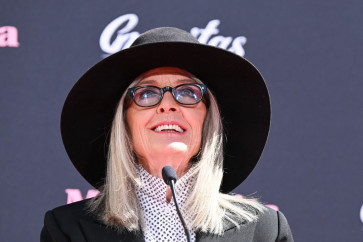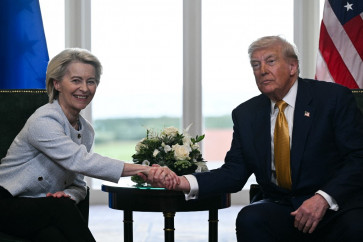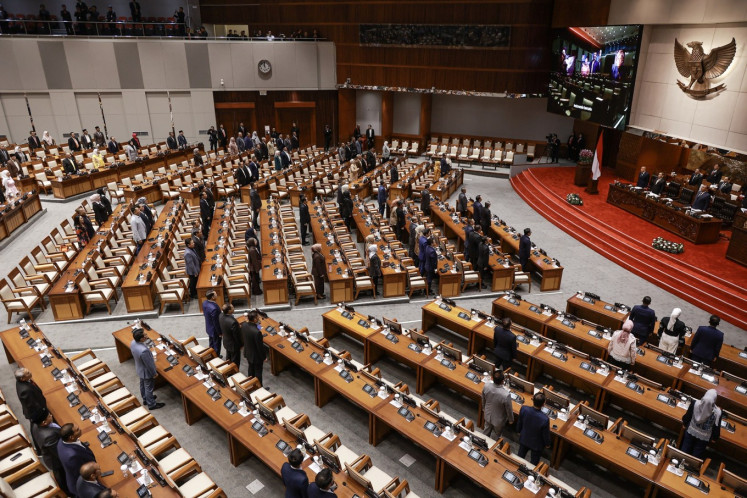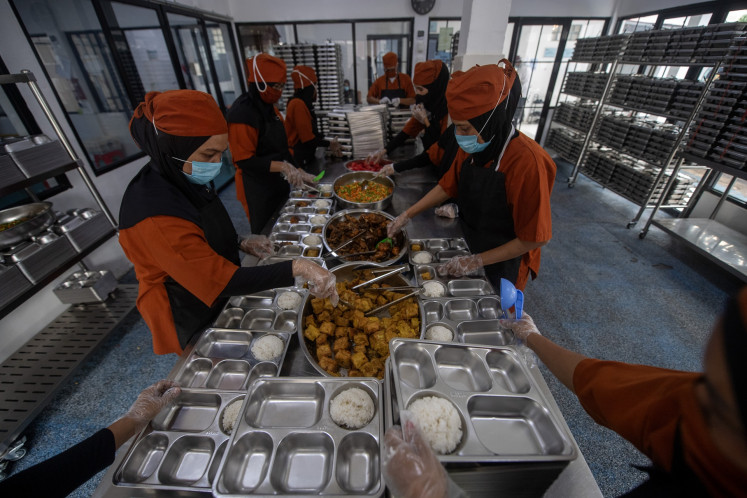Popular Reads
Top Results
Can't find what you're looking for?
View all search resultsPopular Reads
Top Results
Can't find what you're looking for?
View all search resultsIndonesian and Korean filmmakers meet to talk business
Moviegoers: Actor Vino G
Change text size
Gift Premium Articles
to Anyone
 Moviegoers: Actor Vino G. Bastian (from left to right), Korean movie buff Yono Purnomo, head of Association of Indonesian Film Producers (APROFI) Sheila Timothy and film producer Luki Wanandi attends a screening in Jakarta, on Monday. (JP/DON) (from left to right), Korean movie buff Yono Purnomo, head of Association of Indonesian Film Producers (APROFI) Sheila Timothy and film producer Luki Wanandi attends a screening in Jakarta, on Monday. (JP/DON)
Moviegoers: Actor Vino G. Bastian (from left to right), Korean movie buff Yono Purnomo, head of Association of Indonesian Film Producers (APROFI) Sheila Timothy and film producer Luki Wanandi attends a screening in Jakarta, on Monday. (JP/DON) (from left to right), Korean movie buff Yono Purnomo, head of Association of Indonesian Film Producers (APROFI) Sheila Timothy and film producer Luki Wanandi attends a screening in Jakarta, on Monday. (JP/DON)
M
span class="caption" style="width: 598px;">Moviegoers: Actor Vino G. Bastian (from left to right), Korean movie buff Yono Purnomo, head of Association of Indonesian Film Producers (APROFI) Sheila Timothy and film producer Luki Wanandi attends a screening in Jakarta, on Monday. (JP/DON)
Filmmakers from Indonesia and South Korea have gathered in Jakarta for a three-day workshop to exchange experiences, develop film as a business and to boost cinematic quality.
Fauzan Zidni, secretary-general of the Association of Indonesian Film Producers (APROFI), said the group wanted to reciprocate after the Korean Academy of Film Arts (KAFA) invited Indonesian movie producers and directors to South Korea in January.
'This time, we invited 17 filmmakers from South Korea to share their experiences with local producers and directors in terms of film promotion, co-education and co-production,' he told The Jakarta Post on the sidelines of the event's welcome dinner on Monday evening.
Participants would also attend a screening of Mouly's Surya's Sundance hit What They Don't Talk When They Talk About Love, which Fauzan produced, on Tuesday afternoon, he said.
Fauzan said that Indonesia and South Korea had signed a memorandum of understanding (MoU) to boost cooperation to promote creative industries, including film, in October.
'The MoU paved the way for more comprehensive cooperation and exchanges of information in creative industry, as well as various projects between two countries,' he said.
Fauzan added that APROFI was established in September 2013 and comprised 30 local filmmakers, aiming to improve the quality of Indonesian film industry to gain international recognition.
According to Fauzan, Sheila 'Lala' Timothy, the producer of Pintu Terlarang and Modus Anomali, would chair APROFI until 2016, after a declaration was made by the Association of Indonesian Cinema Producers (APSI).
APSI, one of nine Indonesian film industry professional associations, was also part of the Indonesian Motion Picture Association (IMPAS), Fauzan said. 'Other producers, like Mandy Marahimin, Shanty Harmayn, Mira Lesmana and Erwin Arnada are also involved.'
KAFA director Equan Choi said the event fostered introductions and an understanding of the problems facing the film industries ofboth countries.
Equan said that his non-profit organization aimed to to motivate local filmmakers, who often lacked information to enhance their movies' quality.
Equan, who produced three Korean movies, said that the local film industry had improved its infrastructure, although it was attracting few investors.
'Indonesian filmmakers want to sell 'kick-ass' movies ' as many as they want. They need to have more movies in theaters, but they have a lot of big gaps in the economy, especially when they need to shoot their movies outside Jakarta or in rather secluded areas,' he said.
Equan said Korean filmmakers faced similar problems in 1994, when he first started his career and Korean movies were unpopular, since few wanted to watch anything besides US movies.
The situation changed when large Korean business conglomerates, or chaebol, such as Samsung and Daewoo, started to invest in the film industry to gain prominence.
'We acknowledge that we are very lucky, because the situation led us to increase filmmaking in different styles.' Equan said. 'It gave us stimulus to create movies with big budgets.' (gda)









